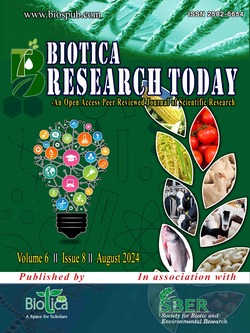
Plant Gene Editing Approaches for Enhancing Pest and Disease Resistance
B.G. Sangeetha*
Division of Crop Protection, ICAR-Central Tuber Crops Research Institute, Sreekariyam, Thiruvananthapuram, Kerala (605 017), India
T. Makeshkumar
Division of Crop Protection, ICAR-Central Tuber Crops Research Institute, Sreekariyam, Thiruvananthapuram, Kerala (605 017), India
E.R. Harish
Division of Crop Protection, ICAR-Central Tuber Crops Research Institute, Sreekariyam, Thiruvananthapuram, Kerala (605 017), India
DOI: NIL
Keywords: Pest, Gene editing, Transcriptomics, Disease
Abstract
The crop plants have been domesticated from 10000 years ago and conventional breeding methods were used for developing new crop varieties. With the development of new sequencing technologies about 300 of reference plant genome is available in various nucleotide database and diversity of crop wild relatives (CWRs) genome can be utilized for developing new cultivars. The CRISPR/Cas9 technology has been successfully applied across a range of crops, including rice, wheat, tomato, potato, tobacco and maize. The gene edited plants can be developed by inserting mutations at target sites in plant genome without inclusion of foreign gene. A list of genome editing techniques have been adapted for use in plant genomes, such as homologous recombination (HR), ZFNs, TALENs, PPRs, the CRISPR/Cas9 system, RNAi, as well as cisgenesis and intragenesis.
Downloads
not found
Reference
Blanvillain-Baufum, S., Reschke, M., Sole, M., Auguy, F., Doucoure, H., Szurek, B., Meynard, D., Portefaix, M., Cunnac, S., Guiderdoni E., Boch, J., Koebnik, R., 2017. Targeted promoter editing for rice resistance to Xanthomonas oryzae pv. oryzae reveals differential activities for SWEET14-inducing TAL effectors. Plant Biotechnology Journal 15(3), 306-317. DOI: https://doi.org/10.1111/pbi.12613.
Ren, B., Yan, F., Kuang, Y., Li, N., Zhang, D., Zhou, X., Lin, H., Zhou, H., 2018. Improved base editor for efficiently inducing genetic variations in rice with CRISPR/Cas9-guided hyperactive hAID mutant. Molecular Plant 11(4), 623-626. DOI: https://doi.org/10.1016/j.molp.2018.01.005.
Wang, S., Zong, Y., Lin, Q., Zhang, H., Chai, Z., Zhang, D., Chen, K., Qiu, J.L., Gao, C., 2020. Precise, predictable multi-nucleotide deletions in rice and wheat using APOBEC-Cas9. Nature Biotechnology 38, 1460-1465. DOI: https://doi.org/10.1038/s41587-020-0566-4.
Wang, W., Ma, S., Hu, P., Ji, Y., Sun, F., 2021. Genome editing of rice eIF4G loci confers partial resistance to rice black-streaked dwarf virus. Viruses 13(10), 2100. DOI: https://doi.org/10.3390/v13102100.
Zsogon, A., Ccermak, T., Naves, E.R., 2018. De novo domestication of wild tomato using genome editing. Nature Biotechnology 36, 1211-1216. DOI: https://doi.org/10.1038/nbt.4272.
